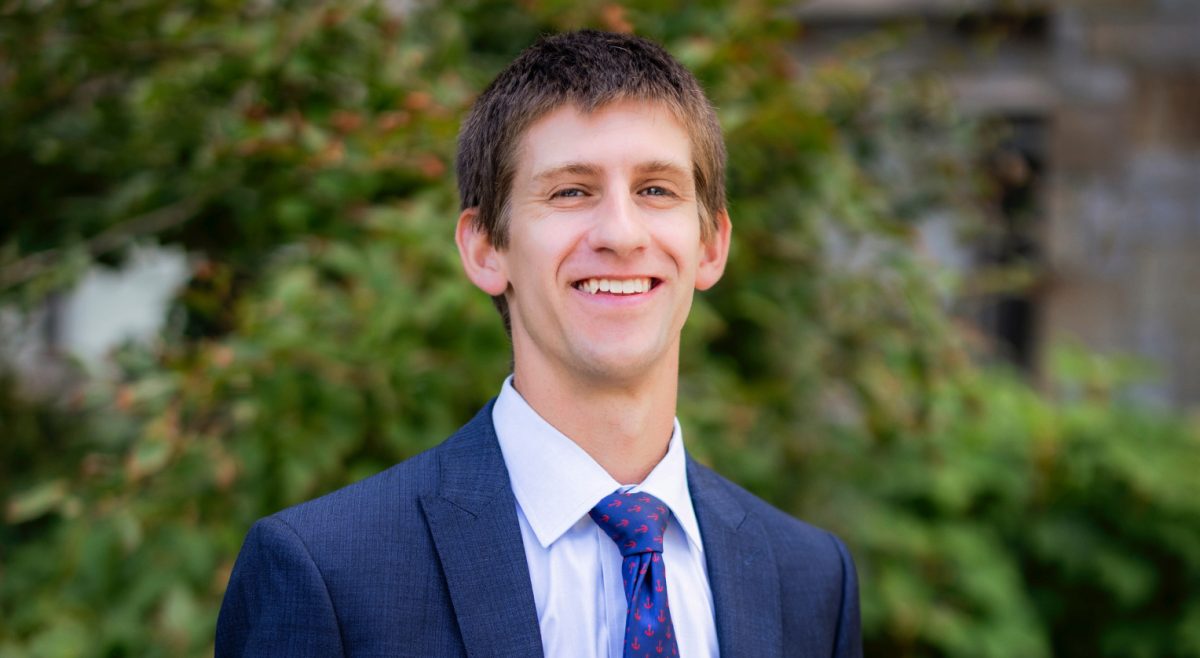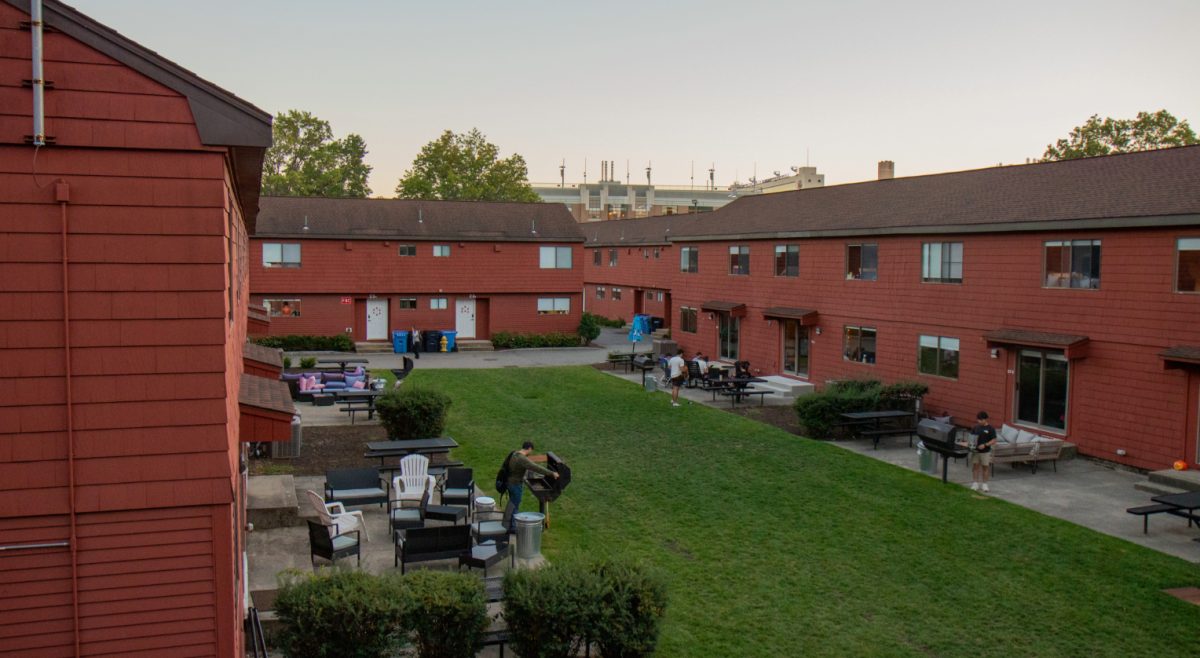Eight students explain the motivation, process behind the Ted Talk-like lectures delivered Sunday night in The Heights Room.
By James Lucey, DJ Recny, Archer Parquette, Ashley Stauber, and Barrette Janney
Editor’s Note (11/29/2018): One student’s entry was removed at the request of a federal employer.
Morgan Dykman
Struggling with mental health is a difficult and painful battle, but Morgan Dykman, MCAS ’18, believes that this struggle comes with unexpected benefits and can help Boston College students realize that they are more powerful than they might think. After experiencing anxiety during high school, Dykman faced depression during her sophomore year at BC and has had to deal with the dark sides of mental illness. But instead of focusing on these aspects in her BC Talk, “The Bright Side of Dark Stigma: The Positives of Struggling With Mental Illness,” she wants to use the forum to show students that there are bright sides to the struggle.
“I think a lot of BC students have mental health issues,” Dykman said in an email. “I think what they will take away from my talk is that it is ok to talk about it.”
In the past, Dykman has read articles or attended talks and events about mental health issues. She found that these events usually focus on the unpleasant and negative aspects of mental illness, which she says she doesn’t benefit from hearing because she has already experienced these things herself. Hearing more about them and seeing only the bad portions of the illness highlighted served only to worsen the situation for her. Instead, learning about the potential benefits of the struggle offers a new way to approach the issue.
“My mental health experiences have made me closer to my peers and my professors in a whole new way,” she said. It is these potential benefits of struggling with mental illness that Dykman believes are often ignored in discussions of mental illness, and her talk brings this experience to light.
While mental illness can often come with a stigma, Dykman hopes to show students that it is perfectly okay to talk about mental health. The freedom of the BC Talks forum allows her to share her experience the way that she wants to without the restriction that some other forums present. Examining the issue of mental health from a new perspective shows students that there is more than just negativity in mental illness.
“I think it gives BC students a chance to share things without having a label already put on them,” she said.
Harry Cheung
Why do you volunteer? This is the question that Harry Cheung, MCAS ’16, attempted to uncover in his BC Talk, titled “Leaving Your Mark on the World.” Rather than just talking about his volunteering experience, Cheung spoke to the motivation to volunteer and help others.
Cheung, who is from Farmingdale, Maine, with a population of just under 3,000, said that his desire to volunteer was instilled in him from a young age.
“I think coming from such a small town and a small community opened my eyes to how everything is better when people work together,” he said. “It was always refreshing to see people drop everything just to help someone, even if they weren’t family.”
Cheung said that although these ideals are instilled in many, it can be easy to lose sight of why you are volunteering in the first place. As is natural, he said, it’s easy to get caught up in yourself when you are giving back, rather than focusing on the people you are helping.
“It’s so easy to forget what drove us to serve and to help others when we get caught up in the benefits it can bring us, the long hours that we put in, or how competitive it can be, particularly at BC,” he said. “It’s also so easy to get conditioned to the situations of the people we’re helping that we no longer feel that same shock and drive that originally sparked us.”
Cheung hopes that when people hear his talk, they will appreciate that the world needs people to volunteer. They don’t have to cure world hunger or cure a major disease, but the little things add up.
“It starts with a simple decision to take the initiative and to maintain that zeal to help the world, bit by bit,” he said.
On top of this, Cheung also said that we are very fortunate to attend a university that emphasizes volunteer work as much as it does. This, he said, is another reason to give back.
“It’s important that we live up to the challenge to change the world for the better,” he said.
Aniket Saoji
Aniket Saoji, a double major in computer science and philosophy and MCAS ’16, is looking to change the way we light cities. In his BC Talk, “The Internet on Steroids: How IOT Lights can make Cities Smarter,” Saoji explains a project he is currently invested in. In the program, there would be sensors positioned on every light in a city that allow a connected grid to “talk” to a program, which translates the sensors’ information into something we can use. An example he gave was with parking spaces—if there are sensors on the traffic lights above a parking space, it can receive information based on whether or not a car is parked in that space, which can create an online system telling where there are open parking spaces.
Hailing from the Bay Area, Saoji said that growing up around the technology industry helped inspire him to study computer science and to pursue projects such as this. Additionally, he worked on this project with GE over summer to advance his knowledge in the niche market of “intelligent cities.” This, he said, is the core of his BC Talk.
Saoji said that having “smarter” cities can make life more efficient. He also said that doing research like this at BC helps advance science programs at the University.
“We’re not a techy school like MIT, so what we see is reactive,” he said, referring to tech research at Boston College. “If I can present topics like this, we can become more proactive in creating this technology for ourselves.”
Although the first real-time applications of these light sensors are taking place in San Diego, Saoji has already put some thought as to how Boston can benefit from these advances.
“The city of Boston has around 67,000 electric lights,” he said. “We can utilize the amount of lights in our city alongside a connected grid that allows for more efficient parking, stronger public safety, optimized traffic flow, indoor positioning systems, and energy efficient buildings.”
Parking isn’t the only thing that can be improved by this technology. These sensors can detect people in rooms, pedestrians on sidewalks, and traffic flow. As Saoji points out, this technology can turn Boston into a smart, efficient intelligent city. As Saoji said, the future is looking bright.
Yeojin Yoon
When Yeojin Yoon, MCAS ’17, talked about her upcoming BC Talk, she had to pivot the topic a few times. Not surprising in the slightest—the conversation at hand wasn’t an easy one.
Her speech, “When Difficult is Difficult,” touched upon feelings of otherness and broadening realities, and it intended to strike chords of human emotion that transcend merely surface-level differences.
“Can I talk about my background first?” Yoon asked when she began to talk about her topic. “I think it’d make the most sense.”
Yoon, who is originally from Seoul, South Korea, moved to the United States when she was 13 and is currently going into her 10th year of living in America. Most recently, she experienced her very first Fourth of July fireworks.
Coming from a multinational background comes with all kinds of complications, the most obvious being the legal ones. Yoon is not a citizen of the U.S. and, as she explained with some hesitation, is still classified as a legal ‘alien.’ Though this status has severely complicated Yoon’s employment opportunities, among other things, the real point of confusion for her has been a matter of identity and her feeling of belonging.
“I spent my developmental period in a different place—I’m very Americanized,” Yoon said. “It’s always a struggle for anyone who comes from more than one culture to find out what you really are and what you identify with more. I feel like there’s always this sense of balancing the two, and I feel like that’s especially difficult at a place like BC.”
Having recently come into a consciousness about this lack of identity, Yoon wanted to express this feeling, but struggled with how her audience would digest the message. By expressing this sentiment in terms of racial “otherness,” Yoon feared that the message would be lost on many who have never experienced a racial stigma, or a stray microaggression.
Instead, Yoon opted for a more human route. By focusing on the human feeling of being an outsider, Yoon’s goal became to tap into an essential human emotion—the feeling of not belonging.
By tapping into this universal human experience, Yoon hoped that the audience could have a collective moment of understanding. By using human emotion to make the moral accessible to everyone, Yoon hoped to create a conducive conversation about a broadening perspective.
“I think it’s really important to turn your singular reality into multiple realities,” Yoon said. “If I were to describe my biggest purpose in one word, it would be mindfulness. Being aware and being mindful are two different things.”
Anthony Perasso
Being held back a year in preschool might have changed Anthony Perasso’s life. It’s hard to believe that the extroverted senior, well-known for being the editor-in-chief of The New England Classic and for his Undergraduate Government of Boston College (UGBC) presidential run last year, might once have been known for being overly shy, but that’s what led to his second year in preschool.
“I used to just make fun of myself for that,” Perasso said. “But now I get that an extra year there or something makes a difference. How you behave with people and make friends impacts how you learn.”
Perasso has clearly left his shyness behind. The benefits he received from his extra time in preschool very well might have helped shape him into the person he is today, and his presentation at BC Talks, titled “preschoolis.cool,” demonstrated these benefits, not only economically and cognitively but also through larger personal development.

“Something that happens when you’re 4 can help problems that we deal with when people are 20,” Perasso said.
His talk was part of an independent study he is conducting with Julia Devoy, which collects information from over 30 other studies about the effects of preschool in an attempt to come to new conclusions about the “intangible benefits” of a preschool education and then present these conclusions in the form of a website. This final website is supposed to translate the “academic jargon” of these wide-ranging studies into larger conclusions with easy-to-understand graphics and videos that anyone from an interested parent to a potential lawmaker could consult.
While students on campus might know about Perasso’s interest in internet media and communication, they might not know about his concern for education and helping kids. As a transfer into the Lynch School of Education, Perasso would like to see increased funding for preschool programs, which are not a nationwide requirement, or the development of legislation to improve programs across the country. It still remains an unaffordable option for some parents, despite the reality that preschool can benefit students who might not be able to afford it.
“There’s 40 or 50 years of research about preschool’s cognitive benefits or economic benefits, but there’s still no ‘when you’re 4 you have to be in preschool,’” Perasso said. “Preschool’s seen as maybe optional.”
Michaela Simoneau
How can we help people when it’s a challenge to communicate with them about their needs? This question is one of the central focuses of Michaela Simoneau’s upcoming BC Talks presentation.
Simoneau, a double major in international studies and biology and MCAS ’18, presented “Hari Om: A Model of Accompaniment for International Development.”
Simoneau is part of BC’s chapter of GlobeMed, a national network that pairs universities with community health organizations around the world. Her involvement with this program allowed her the opportunity to start an internship in India, which helped her explore the role that public health plays in international development and the importance of communication.

“It’s amazing when you have these grassroots organizations that are so involved in the lives of the people they are working with,” she said. “We would go with some of the workers into the villages, and they would sit with a person in their house for maybe 45 minutes just talking about life. There is this basic level of dialogue and trust that allows them to put their bigger programs into action.”
Simoneau also witnessed the negative effects of a lack of communication.
She recalled an experience of seeing a public restroom built by the government that lacked running water, rendering the entire project useless.
“The people implementing change weren’t communicating with the people there,” she said. “Instead [they] took the framework of what they thought should be changed and forced it on the people.”
For Simoneau, viewing this failure only reinforced the importance of partnership-based community networks. She referenced “coordination failure,” a concept she learned about in one of her international studies classes, to explain how hard it is to get people to work together, which is why bonds of communication and trust on different levels are essential in implementing large-scale change.
“Use resources wisely, do the research and connect with other people who have already started programs on the ground, because change needs to come out of motivators who are already in the community,” Simoneau said.
Reed Piercey
When Reed Piercey, MCAS ’19, began volunteering at Samaritan’s Hotline, a suicide prevention and intervention hotline that serves the greater Boston area, he expected he’d be doing a lot of the talking. Instead, when he completed his training and began taking to the phones last February, he found the experience to be completely different.
“A lot of people think of a hotline or think a service like Samaritan’s is the image of talking someone down—of getting out there steering the conversation,” Piercey said. “But I think that’s a pretty big misconception. In most calls that have stuck with me, it hasn’t been me who’s doing the work in terms of who carries the conversation.”
Instead, Piercey discovered that the most powerful support a person could offer is simply that of an empathetic ear. In his BC Talk, “The Lost Art of Empathy,” Piercey shared this sentiment and lessons like it as they pertain to the relationships between all of us.
“I’m mainly hoping to convey what my experiences working at Samaritan’s [has] taught me,” Piercey said before his talk. “What it means to be there for someone … The reason a lot of people end up in a dark place emotionally is because they don’t have someone to share their thoughts with.”
Often, it feels like everyone has an opinion of what the best thing to do is. The first instinct of many when approached by a friend or peer in need is to advise that person—to provide advice or give instructions that they think may remedy the situation. Piercey has found, however, that we rarely realize that all someone may need is a companion to simply be present—to hear what he or she has to say on a deeper level.
“It’s more that we’re providing a space of non-judgment and a space where the caller can feel like their voice is being heard,” Piercey said of what he has learned on the phones at Samaritan’s. “I’ve heard so much crushing loneliness, and what a lot of people don’t realize is that you don’t have to be super eloquent or a brilliant conversationalist or anything.”
The most difficult part of this, to Piercey, is that it is often antithetical to the purpose of college. The whole trajectory of college, in some sense, is making yourself heard—shaking the right hands, getting the right grades, getting the right internships. Though these are certainly important, Piercey hoped that people would walk away from his talk with a broadened sense of awareness of others.
“It can be so valuable to seek to understand, rather than to seek to be understood,” Piercey said of the message. “If they can come out with a better understanding of just how much that means to someone—because it doesn’t seem like you’re doing much in the moment—that’s really all I hope for.”
Correction: this article has been updated to reflect that Aniket Saoji is a computer science major.
Featured Image by Abby Paulson / Heights Editor













HaroldAMaio • Nov 7, 2016 at 6:39 am
–It is the stigma behind depression that cripples it and leads to devastation??
It is not.
If one can be taught to say the prejudice and discrimination surrounding mental illnesses is “stigma”, they have learned a basic lesson of prejudice: Blame the victim. Teach the victim to self-blame.
It is the stigmatizers who are to blame for prejudice, not the person at whom they direct their prejudice. It is the person with the prejudice, who is to blame, not the issue at which they direct their prejudice.